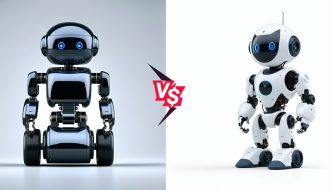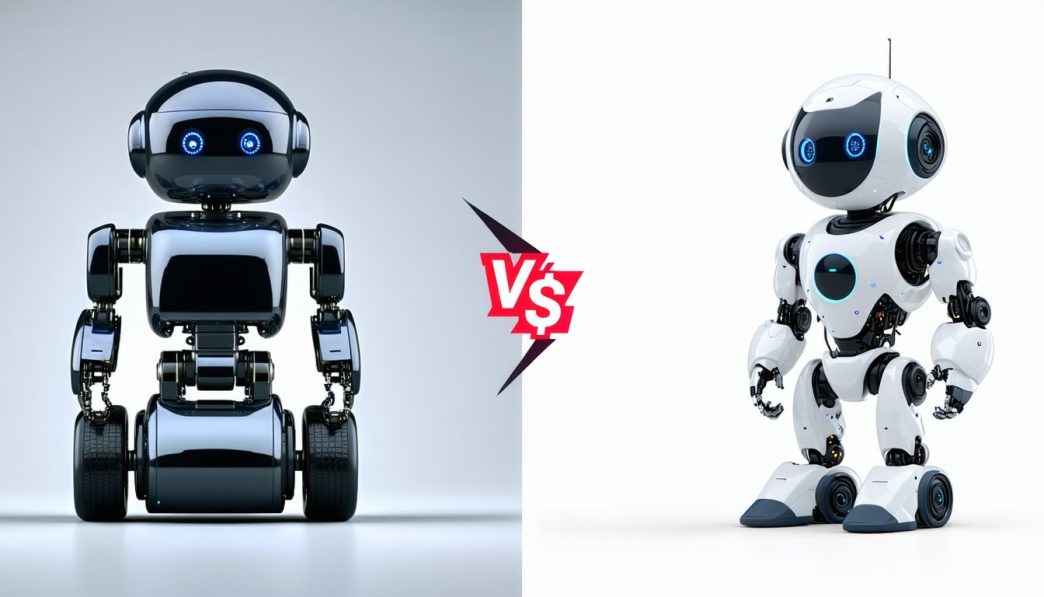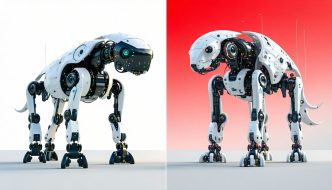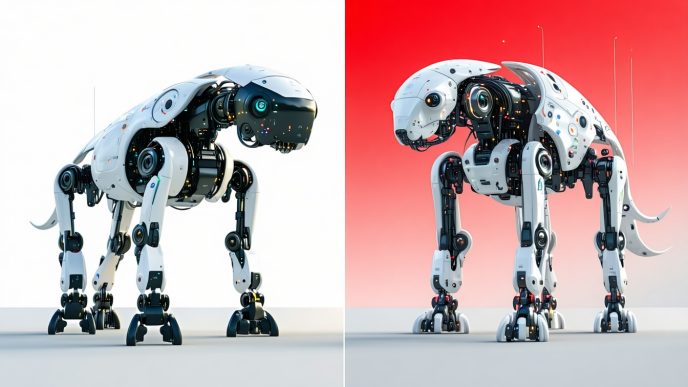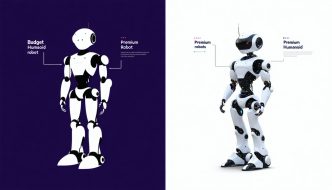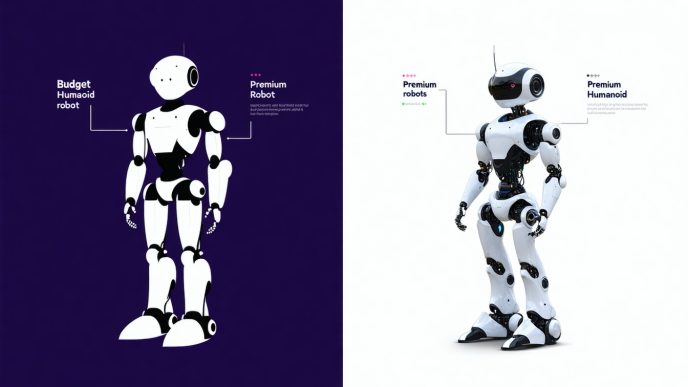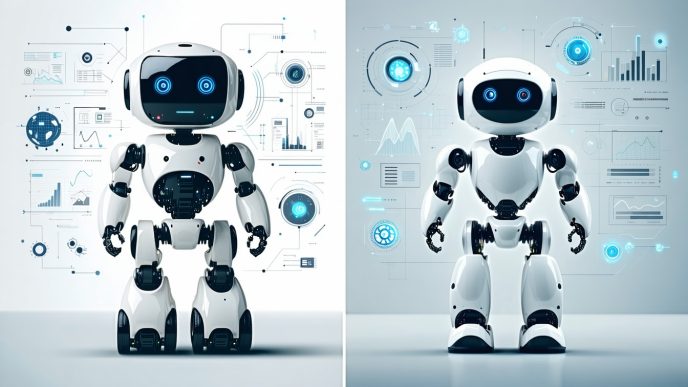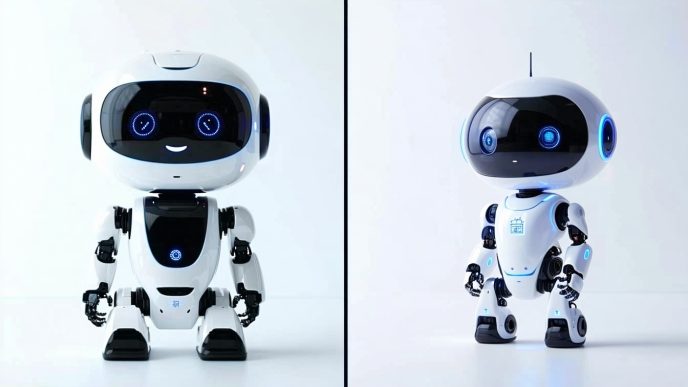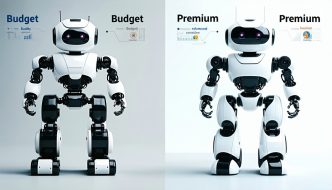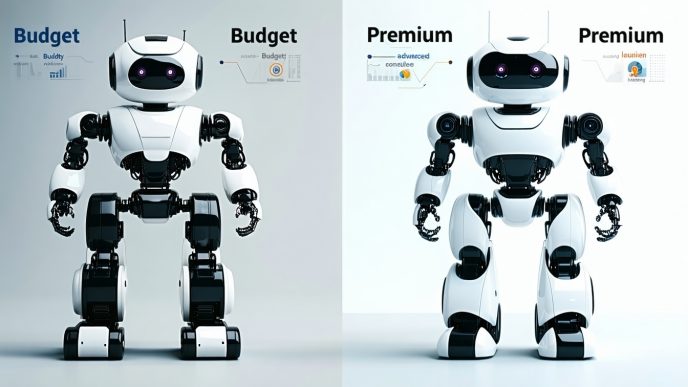Evaluating Your Options: Budget vs Premium Robots
When considering whether to invest in budget or premium robots, it’s essential to evaluate various factors that influence the overall decision.
Understanding the Factors to Consider
A thorough comparison includes several key elements that buyers should examine. These aspects can significantly impact not only the initial purchase price but also the robot’s performance and future costs:
- Features: Assessing the available functionalities that each robot offers, such as advanced navigation systems or AI capabilities.
- Build Quality: Evaluating how the materials and construction affects durability and reliability. Refer to our article on robot build quality budget vs premium for more insights.
- Maintenance Requirements: Understanding the ongoing costs of upkeep for various models. More information can be found in the article on robot maintenance costs budget vs premium.
- Battery Life: Analyzing how different robots perform in terms of charge duration and recharge time. Explore our article on battery life budget robots vs premium robots for a detailed comparison.
Importance of Cost, Performance, and Long-Term Value
When differentiating between budget and premium robots, cost, performance, and long-term value are critical metrics for evaluation.
| Factor | Budget Robots | Premium Robots |
|---|---|---|
| Initial Cost | Lower initial investment, making them attractive for value-conscious buyers. | Higher upfront cost, often justified by enhanced features and reliability. |
| Performance | May lack advanced technology, impacting efficiency and effectiveness. | Generally provide superior performance with better sensors and software capabilities. |
| Long-Term Value | Potentially higher maintenance and replacement costs could erode savings over time. | Designed for longevity, often resulting in a better return on investment. Review details in our article on return on investment for budget vs premium robots. |
Understanding these factors helps buyers make an informed decision about which robot best meets their current needs while considering long-term expenses and benefits. For a more specific comparison based on robot type, check out our articles on budget humanoid robots vs premium humanoid robots, budget quadruped robots vs premium quadruped robots, budget companion robots vs premium social robots, and budget AI assistants vs premium AI assistants.
Budget-Friendly Robots
When considering the purchase of robots, budget-friendly options present an attractive choice for consumers who are value-conscious. Understanding the characteristics and the advantages and disadvantages of these robots can help buyers make informed decisions.
Characteristics of Budget Robots
Budget robots typically offer a more basic feature set when compared to their premium counterparts. Key characteristics include:
- Affordability: Economical prices make these robots accessible to a broader audience.
- Simpler Design: Often less complex than premium options, with fewer advanced features.
- Basic Functionality: Sufficient for essential tasks but may lack high-end capabilities.
- Limited Customization: Fewer options for personalization and upgrades.
- Shorter Warranty Period: Typically, budget robots come with limited warranty coverage.
| Feature | Budget Robots |
|---|---|
| Price Range | $100 – $500 |
| Typical Functions | Basic cleaning, simple navigation |
| Average Warranty | 1 year |
| Customization Options | Minimal |
Pros and Cons of Budget-Friendly Options
Choosing budget robots does come with its set of advantages and disadvantages.
Pros:
- Lower Initial Investment: These robots offer a way to enter the market without a heavy financial commitment.
- Satisfactory Performance for Basic Tasks: Ideal for users who need simple functionality without advanced features.
- Ease of Use: Often designed for straightforward operation, making them user-friendly for those with limited tech experience.
- Fairly Good Battery Life: Many budget robots still provide a reasonable battery performance for everyday tasks.
Cons:
- Limited Features: Users may miss out on advanced functions present in premium models.
- Potential Reliability Issues: As with any budget product, there may be concerns regarding long-term durability and performance.
- Higher Maintenance Costs: In some cases, budget robots may require more frequent repairs or replacements, which can add to their total cost of ownership. For maintenance considerations, refer to our article on robot maintenance costs budget vs premium.
- Lower Resale Value: Budget robots may not retain value as well, resulting in less return on investment when reselling. Explore more about ROI in our article on return on investment for budget vs premium robots.
While budget robots can be a cost-effective solution, understanding their limitations is crucial in making an informed decision compared to investing in premium options. For further insights, consider the comparisons of different robot types, such as budget humanoid robots vs premium humanoid robots or budget AI assistants vs premium AI assistants.
Premium Robots
When comparing robot options, premium robots stand out due to their advanced features and enhanced performance. Understanding the characteristics and pros and cons of these higher-end models can help buyers make informed decisions.
Characteristics of Premium Robots
Premium robots typically offer a range of features that distinguish them from their budget counterparts. Here are some key characteristics:
- Advanced Technology: Equipped with cutting-edge sensors and machine learning capabilities, they can adapt to various environments and tasks.
- Robust Build Quality: Premium robots are often designed with high-quality materials, resulting in greater durability and longevity.
- Enhanced Performance: With superior processing power, these robots perform tasks faster and more efficiently.
- Better Navigation Systems: Many premium models come with sophisticated navigation systems that allow for precise movement and obstacle avoidance.
- Extended Battery Life: Premium robots usually feature longer battery life, reducing downtime and improving usability.
- Intuitive User Interfaces: Users benefit from highly responsive controls and user-friendly software applications for better interaction.
Pros and Cons of Premium Options
Examining the pros and cons of premium robots can aid in understanding their value compared to budget models.
| Pros | Cons |
|---|---|
| Higher reliability and often lower maintenance costs | Initial investment is significantly higher |
| Better performance for complex tasks | May be more challenging to find compatible accessories |
| Advanced safety features reduce the risk of accidents | Can be more expensive to repair if something goes wrong |
| Longer lifespan and better warranty options | Some features might be unnecessary for casual users |
| Enhanced usability and customization options | Higher upfront costs may not fit everyone’s budget |
Premium robots are ideal for those who value longevity and advanced features that justify the higher price. For those weighing their options, it’s crucial to consider factors such as navigation systems budget vs premium robots and robot maintenance costs budget vs premium when deciding whether to invest in premium technology. Exploring the battery life budget robots vs premium robots can further inform one’s choice.
Making the Decision
Choosing between budget vs premium robots involves assessing personal needs and priorities. This process requires thoughtful consideration of what features are essential and how they align with long-term goals.
Determining Your Needs and Priorities
When determining personal needs, individuals should consider the specific tasks they expect the robot to perform. For example, someone looking for a robot for simple household chores may find a budget-friendly option sufficient, while a tech enthusiast requiring advanced features may prefer premium robots. Important factors to evaluate include:
- Purpose: Is the robot meant for cleaning, assistance, or companionship?
- Frequency of Use: Will the robot be used daily or occasionally?
- Technology Comfort: Is the user comfortable with advanced technology or AI?
Weighing the Trade-offs
It’s essential to weigh the trade-offs when comparing budget and premium options. The following table outlines some key factors to consider in this decision-making process.
| Factor | Budget Robots | Premium Robots |
|---|---|---|
| Initial Cost | Lower price | Higher price |
| Performance | Basic functions | Advanced features |
| Durability | Generally less robust | Designed for longevity |
| Maintenance Costs | May require more frequent upkeep | Typically lower long-term maintenance |
| New Technology | Slower to integrate | Early adopters of tech |
| Return on Investment | Shorter lifespan | Potential for higher value over time |
Understanding the balance between upfront costs and long-term value is crucial. For instance, while a budget robot may appear attractive for immediate savings, it could incur higher maintenance costs and possibly shorter lifespan when compared to a premium robot. Evaluating aspects like robot maintenance costs budget vs premium can provide further clarity.
For those looking at specific functions, articles such as budget AI assistants vs premium AI assistants and battery life budget robots vs premium robots offer deeper insights into how these factors play into the budget vs premium robots discussion.
Factors Influencing Your Choice
When deciding between budget and premium robots, several key factors will influence the choice. These include durability and maintenance, advanced features and technology, and long-term cost efficiency and value.
Durability and Maintenance
Durability is a major consideration when evaluating robots. Typically, premium robots are built with higher-quality materials and superior craftsmanship, making them more resilient in the long run. In contrast, budget robots might use less durable materials that could need replacement sooner.
| Feature | Budget Robots | Premium Robots |
|---|---|---|
| Average Lifespan | 2-3 years | 5-10 years |
| Repair Frequency | High | Low |
| Maintenance Cost | Moderate | Low |
Maintenance is another factor. Budget robots may require more frequent repairs or part replacements, which can add to the overall ownership cost. Premium robots often come with better warranties and support services that help reduce long-term maintenance expenses. For a deeper dive into maintenance costs, explore our article on robot maintenance costs budget vs premium.
Advanced Features and Technology
The level of technology and features available can greatly impact functionality and user experience. Premium robots typically include advanced features, such as sophisticated navigation systems, enhanced AI capabilities, and superior battery performance.
| Feature | Budget Robots | Premium Robots |
|---|---|---|
| Navigation | Basic | Advanced (e.g., mapping, obstacle avoidance) |
| AI Capabilities | Limited | Advanced (e.g., learning algorithms) |
| Battery Life | Shorter (1-2 hours) | Longer (3-5 hours) |
Investing in a premium robot may provide users with access to cutting-edge technology that enhances efficiency and usability. For more on battery performance, check our article on battery life budget robots vs premium robots.
Long-Term Cost Efficiency and Value
Ultimately, long-term cost efficiency and value are essential in determining the best choice. While the initial purchase price of premium robots is higher, their durability and advanced features often lead to savings over time through reduced maintenance and operational costs.
| Comparison Factor | Budget Robots | Premium Robots |
|---|---|---|
| Initial Cost | Low | High |
| Estimated 5-Year Ownership Cost | Moderate | Lower |
| Return on Investment | Lower | Higher |
By evaluating potential return on investment through performance and longevity, value-conscious buyers can make informed decisions. For insights on investment returns, visit our article on return on investment for budget vs premium robots.
Exploring these factors will aid in making a decision that balances cost with desired performance and long-term satisfaction.

